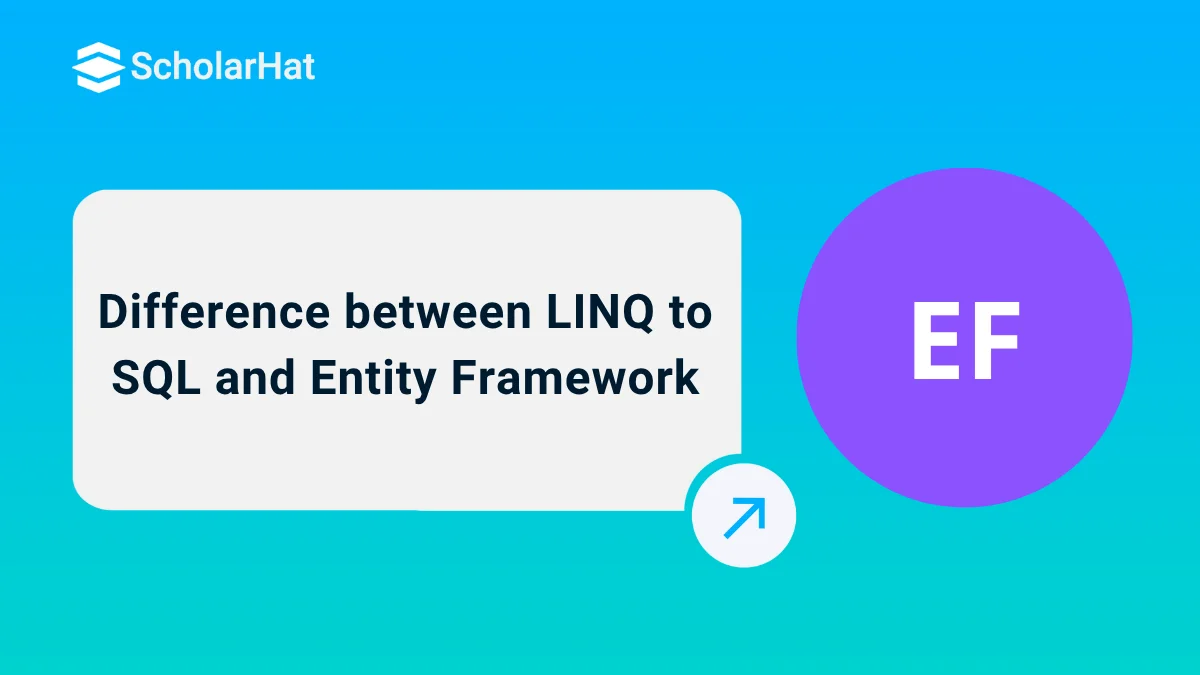20
FebDifference between LINQ to SQL and Entity Framework
LINQ to SQL Vs Entity Framework
The LINQ to SQL allows us to query and modify SQL Server databases by using LINQ syntax. Entity framework is a great ORM shipped by Microsoft which allows us to query and modify RDBMS like SQL Server, Oracle, DB2 MySQL, etc. by using LINQ syntax. Today, EF is widely used by every .NET application to query to database.
However, if you especially want to learn Entity Framework from scratch have a look at theEntity Framework Tutorial. Here we Provided Beginner, Intermediate, and Advanced concepts of Entity Framework. Now let's see the difference between LINQ to SQL and Entity Framework.If we talk about Both technologies they are somewhat similar. Although they provide an ORM framework. But, there are some important differences.
Difference Between LINQ to SQL and Entity Framework
| Aspect | LINQ to SQL | Entity Framework |
| Database Support | Supports only Microsoft SQL Server. | Supports multiple databases such as SQL Server, Oracle, MySQL, PostgreSQL, and more. |
| Scope | Works as a simple O/RM (Object Relational Mapper). | Full-featured ORM with advanced mapping capabilities. |
| Modeling Approach | Directly maps tables to classes (one-to-one mapping). | Supports conceptual, storage, and mapping layers (EDM - Entity Data Model). |
| Inheritance Support | Limited inheritance support. | Supports Table-per-Hierarchy (TPH), Table-per-Type (TPT), and Table-per-Concrete Class (TPC). |
| Relationship Mapping | Supports only simple one-to-one and one-to-many relationships. | Supports one-to-one, one-to-many, and many-to-many relationships. |
| Complex Types | Does not support complex types. | Supports complex types and value objects. |
| Lazy Loading | Not supported. | Fully supports lazy loading. |
| Change Tracking | Basic change tracking. | Advanced change tracking and concurrency handling. |
| Stored Procedures | Supports stored procedures with limitations. | Full support for stored procedures, functions, and views. |
| LINQ Queries | Supports only LINQ-to-SQL queries. | Supports LINQ-to-Entities and Entity SQL queries. |
| Performance | Lightweight and faster for simple applications. | More overhead due to advanced features but scalable for enterprise apps. |
| Migration | No support for database migrations. | Supports code-first migrations and schema evolution. |
| Designer Tool | Provides a simple designer for mapping tables. | Provides advanced EDMX designer and supports code-first, model-first, and database-first approaches. |
| Flexibility | Rigid and limited to SQL Server environment. | Flexible and adaptable to multiple database systems and architectures. |
| Future Support | Discontinued; no future development from Microsoft. | Actively developed and improved by Microsoft (part of .NET ecosystem). |
1) SQL Server only:
The LINQ to SQL works only with SQL Server, especially SQL 2005 and above. Also, It works in a limited way with SQL 2000. On the other hand, Entity framework works with most databases like Oracle, Postgres, DB2, MySQL, and plenty more.
2) One-to-One mapping:
The LINQ to SQL is much simpler than Entity Framework. Because it provides an exact one-to-one mapping between the database table and the class. In terms of the Entity framework, there is a many-to-many relation between the database table and the class. A single database table can map to multiple classes. Or a single class can map to multiple tables.
3) Complex types:
Entity framework allows complex types to be defined. For example, consider the Contact table with the telephone number field. The telephone number is a complex type with properties such as international code, telephone number, and extension. Entity Framework can handle such complex types very well than LINQ to SQL. LINQ to SQL has no support for complex types.
4) Model file format:
In terms of model file format, a DBML file represents the model for LINQ to SQL. The model represents the mapping between the classes and the storage tables. For Entity Framework an EDMX file stores the model.
5) Database first approach:
LINQ to SQL always has a Database-first approach. While Entity framework has three approaches: Database first, Model first, and Code first.1. Database first: Generate model and classes from the database.
2. Model first: Generate database and classes from the model.
3. Code first: Generate database and model from classes.
Conclusion
I hope you will enjoy the LINQ to SQL and EF while playing with the database. I would like to have feedback from my blog readers. Your valuable feedback, questions, or comments about this article are always welcome. Also, Check the below link to learn more about the Entity framework if you have a passion. Enjoy coding...!
FAQs
Take our Entityframework skill challenge to evaluate yourself!

In less than 5 minutes, with our skill challenge, you can identify your knowledge gaps and strengths in a given skill.








